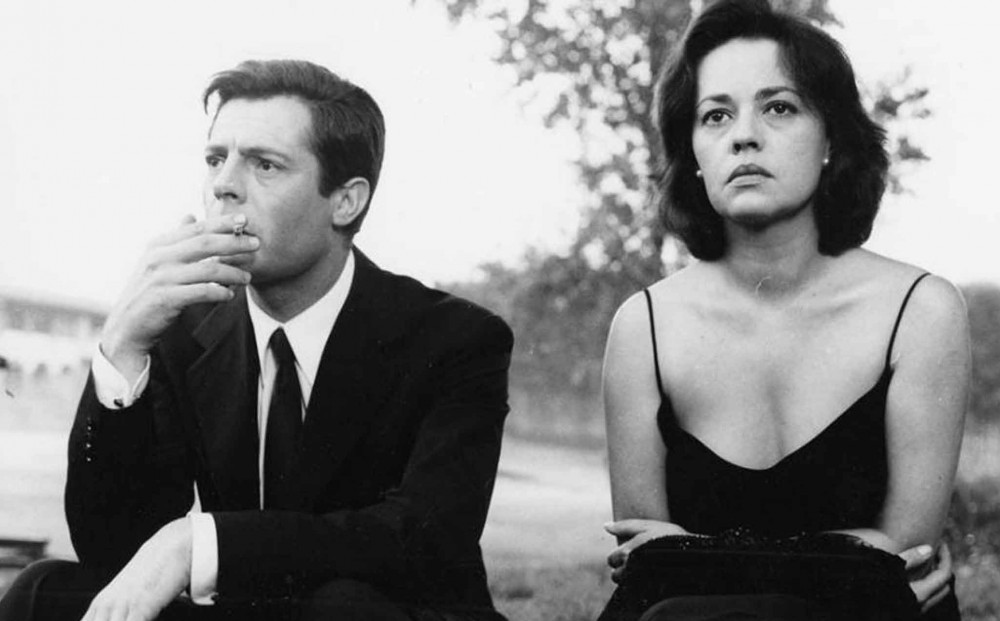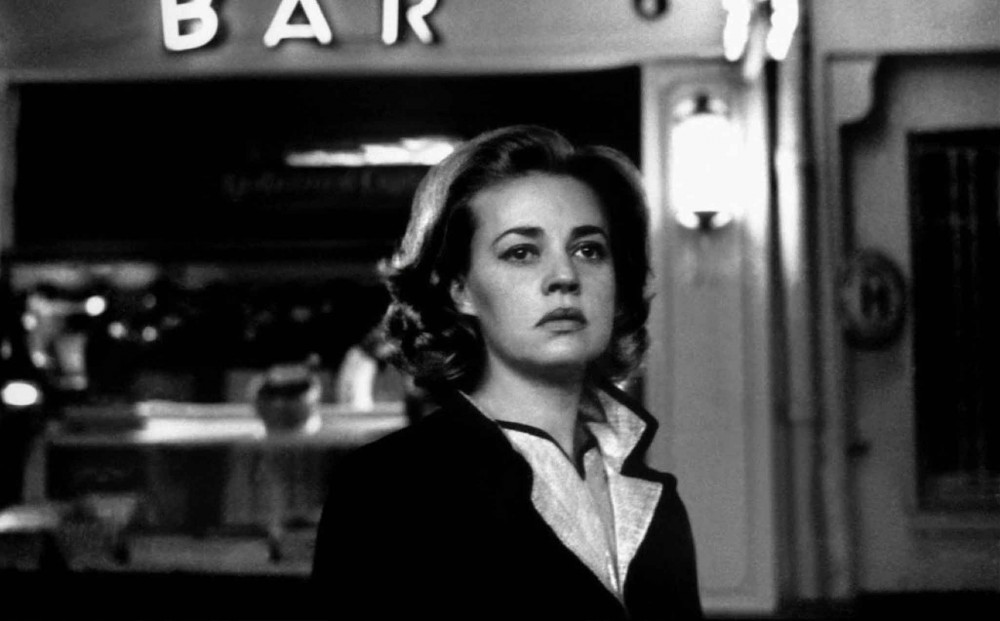ELEVATOR TO THE GALLOWS & LA NOTTE
Saturday, August 26
ELEVATOR TO THE GALLOWS
12:30 4:40 8:50
LA NOTTE
2:20 6:30
ELEVATOR TO THE GALLOWS
Directed by Louis Malle
Starring Jeanne Moreau
(1958) Blonde-tressed Jeanne Moreau and ex-paratrooper lover Maurice Ronet scheme to murder her husband by faking a suicide, but a forgotten rope, a leather-jacketed young punk car thief (Georges Poujouly, the boy of Clément’s Forbidden Games), and a malfunctioning ascenseur conspire to complicate their plans, and then flics Lino Ventura and Charles Denner turn up the heat. For 24-year-old director Malle, his first feature only a year after co-directing (with Jacques Cousteau) the Palme d’Or-winning documentary The Silent World; for Moreau, already dominant on stage (Maggie the Cat in the Paris production of Cat on a Hot Tin Roof), her screen-star-making role after nine years and twenty films; for DP Henri Decaë, a breakthrough in near-total avoidance of artificial light during Moreau’s night-time walk down the Champs-Elysées; for Miles Davis, a brooding, legendary jazz score, recorded in a single all-night session. Winner, Prix Louis Delluc. DCP restoration. Approx. 92 min.
12:30, 4:40, 8:50
“At the time, beautiful actresses were normally photographed in full light… The half-light playing on Moreau’s face as she walked became something of a cinematographic scandale—a shift away from conventional craftsmanship and toward expressive imperfections… A dazzlingly passionate close-up of Moreau at the very beginning of the movie suggests the depths of her longing. This is a movie built around a missed connection, and Moreau’s nocturnal wanderings are made unbearably poignant by an exquisite Miles Davis jazz score that became famous in its own right… The street scenes, the bizarre, anomalous adventures that Moreau has on her nighttime quest, the anarchic kids who just pick up and go—all this looks forward to the New Wave.”
– David Denby, The New Yorker
“SPLENDID. STYLISH SCREEN POETRY. Unforgettably shot by Henri Decaë...The cherry on top is the smoky, melancholic score by jazz titan Miles Davis and crew, recorded in a single session just two years before he would drop Kind of Blue. The film's alchemic blend of Bressonian rigor, Hitchcockian suspense, and overall proto–Nouvelle Vague cool more than compensates for its straightforward plotting.”
– Aaron Hillis, The Village Voice
“Jeanne Moreau, as the boss’s wife is as luminous as ever in black and white. Laced with the self-consciousness of the then-budding French New Wave, with a discursive plot, offhand references to French colonialism and a stylish Miles Davis score.”
– Ben Kenigsberg, The New York Times
“PROTO-NOUVELLE VAGUE STYLE…ELECTRIFYING JAZZ SCORE.”
– J. Hoberman, The New York Review of Books
“Cinematographer] Henri Decaë lends the streets and buildings of Paris and its suburbs a hard, gray cinematic life. Malle includes extended scenes of [Jeanne Moreau] essentially doing nothing—wandering the streets of Paris at night and contemplating her troubles—and he had the inspiration to notice that Moreau doing almost nothing is an absorbing spectacle in itself… Elevator to the Gallows isn’t a New Wave film, but it is significant for its proto-New-Wavishness, its efforts toward originality and modernity.”
– Richard Brody, The New Yorker
“While the sad trumpet that travels alongside its main characters is genuinely one of the best scores of all time, it’s just one of the many virtues of this masterpiece. The film starts contemplative and almost Bressonian, as a man kills his boss using precise movements and careful planning, then it turns into a Hitchcock-style scenario when the assassin gets trapped in an elevator… but the film becomes its own thing, picking up stray plot strands and taking an aimless tone that’s only enhanced by the music and the parallel editing that makes the viewer something akin to a god, watching events without a fixed point of view, wallowing in the sadness and apparent foolishness and clumsiness of the characters. Especially moving are the scenes in which the wife of the killed man wanders the streets, looking for the man who can’t get out of the elevator, her lover, the one she planned the crime with. Her bloodshot eyes and mute demeanor give a powerful romantic thrust you’d think wouldn’t be present in a film springing from such a cruel and cold inciting event.”
– Jaime Grijalba, Brooklyn Magazine
“Abandons the formality of traditional crime films, the almost ritualistic obedience to formula, and shows crazy stuff happening to people who seem to be making up their lives as they go along.”
– Roger Ebert
LA NOTTE
Directed by Michelangelo Antonioni
Starring Jeanne Moreau
(1961) “I no longer have ideas. Only memories.” A day and a night in the life of a troubled marriage, set against Milan’s gleaming modern buildings, its gone-to-seed older quarters, and a sleek modern estate, all shot in razor-sharp b&w crispness by the great Gianni di Venanzo. Writer Marcello Mastroianni and his wife Jeanne Moreau visit a dying friend; drop by a night club with an amazing Black contortionist dancer; then wind up at an all-night party at a suburban villa, where Mastroianni flirts with seeming playgirl Monica Vitti, while Moreau tries for a sports car affair of her own, until a tormented dawn encounter at a deserted golf course. Perhaps Antonioni’s most compassionate examination of the emptiness of the rich and the difficulties of modern relationships (minority naysayer Pauline Kael’s review was headlined: “The Come-Dressed-As-the-Sick-Soul-of-Europe-Parties”); while its tour-de-force, Moreau’s walk through the streets of Milan, “has its place in any film anthology” (Mira Liehm). DCP restoration. Approx. 122 min.
2:20, 6:30
“Externally placid yet bubbling with unrealized dread, sorrow, and sexuality. It’s a muted siren of a movie.”
– Sam Weisberg, The Village Voice
“IMPOSSIBLE TO REPLICATE. An incredibly relatable portrait of distracted disaffection...with the oblique precision of a play, lays out the inevitability of disappointment, the finality of regret, and the failure of love, projecting a shade of self-pity that colors Mastroianni and Moreau’s dual dances of withdrawal into the self and desperate leaps out into the world.”
– Mark Asch, Brooklyn Magazine
“A turbulent dissection of romantic longevity...Antonioni’s most emotionally acute and devastating deconstruction of the interpersonal travails of the bourgeoisie…[his] concern is nothing less than the human condition itself, stripped of melodrama and offered up to the viewer, to either face up to or reject outright, in the purest form the medium has yet conceived.”
– Jordan Cronk, Slant Magazine
“[Antonioni] made his beautiful, skeptical, ironic muse Monica Vitti the arthouse pin-up of the 1960s and created a new Italian cinema – cool, oblique, Marxist – to succeed Neo-Realism. ANTONIONI NEVER MADE ANYTHING BETTER… CINEMA WAS NEVER THE SAME AGAIN.”
– Philip French, The Guardian
“THE MOST MOVING PART OF ANTONIONI’S TRILOGY! Because they are married, and because they are Marcello Mastroianni and Jeanne Moreau – above all, because she is Moreau – La Notte is the gravest movement in Antonioni’s trilogy, the one with L’Avventura and L’Eclisse as its wings…. Moreau’s abandoned face is one of the great images of twentieth-century disaster.”
– David Thomson
“The world of La Notte isn’t an absurd or meaningless one; it’s one that hides its profoundest meaning in plain sight, that owes its almost incalculable profundity to the immediacy of its visual patterns and abstractions, and that Antonioni both damns and redeems in the same gesture, the same moment, by means of his own art.”
– Richard Brody, The New Yorker
“The real beauty of the film, the real depth of its intelligence, continues to lie in the clarity of the montage — the way the world is revealed to us moment by moment. The camera’s delicate interactive grace, participating with the fluidity of the characters’ changing points of view, is profound in itself.”
– Nathaniel Dorsky, Devotional Cinema


